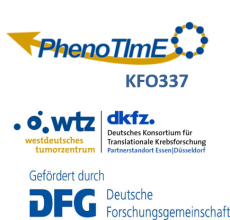PhenoTImE: PhD Project #6
Description Project #6 Identification and functional characterization of long non-coding RNAs as epigenetic determinants of therapy resistance in BRAF-driven cancers
BRAF-mediated activation of the mitogen-activated protein kinase (MAPK) pathway represents an oncogenic hallmark in several cancer types including melanoma (MM) and pilocytic astrocytoma (PA). The contribution of long non-coding RNAs (lncRNA) as regulators of the MAPK pathway and, particularly, of therapy resistance to MAPK inhibition remains poorly understood, but could represent a novel powerful target in oncology. As expression of many lncRNAs is confined to specific developmental programs or cellular states, these transcripts are particularly promising as predictive biomarkers and therapeutic targets. Here, we propose to identify and functionally characterize lncRNAs that are specifically expressed in BRAF-mutant tumors and impede the therapeutic response to BRAF inhibitors. We plan to discover the signaling networks that correlate with these lncRNAs using our established systems biology pipeline. While the mutational landscape of MM is highly complex, PA harbors very limited recurrent mutations mostly in BRAF and other MAPK pathway intermediates causing much lower mutational noise in experimental analysis. We will overlay the BRAF-dependent lncRNA expression profiles from primary MM and PA samples. Subsequently, we will determine the cancer-related role of selected lncRNA candidates using functional genomics approaches upon candidate gene overexpression or depletion in patient-derived cell models and established cell lines from PA and MM, the latter being provided by collaborations within the PhenoTImE consortium. Specifically, we will reveal differential lncRNA expression upon BRAF inhibition and then modulate the expression of the most promising lncRNA candidates to potentially overcome drug resistance. Using clinically annotated tumor samples from MM and PA patients, the resulting lncRNA profiles will be also evaluated regarding their potential as predictive biomarkers for therapy. Lastly, we will utilize a systems biology approach for proteogenomic data combined with high-throughput drug screening to identify and validate synergistic combination therapies with MAPK inhibitors to overcome therapy resistance. We expect from these studies straightforward translational rationales for the design of future clinical trials and for the establishment of further translational biomarker programs alongside.
Project-related publications of the Remke lab (selection):
Forget A*, Martignetti L, . . . Kawauchi D*, Barillot E*,#, Remke M*,#, Ayrault O*,#. Aberrant ERBB4-SRC signaling as a novel hallmark of Group 4 medulloblastoma revealed by integrative phosphoproteomic profiling. Cancer Cell 2018. * co-corresponding authors, # shared senior authorship.
Morrissy AS*, Cavalli FMG*, Remke M*, Ramaswamy V, …,Lichter P, Kool M, Pfister SM, Schüller U, Dirks P, Huang A, Bouffet E, Rutka JT, Bader GD, Swanton C, Ma Y, Moore RA, Mungall AJ, Majewski J, Jones SJ, Das S, Malkin D, Jabado N, Marra MA, Taylor MD. Spatial heterogeneity in medulloblastoma. Nat Genet. 2017 May;49(5):780-788. * equal contribution
Pfister S*, Janzarik WG*, Remke M*, Ernst A, Werft W, Becker N, Toedt G, Wittmann A, Kratz C, Olbrich H, Ahmadi R, Thieme B, Joos S, Radlwimmer B, Kulozik A, Pietsch T, Herold-Mende C, Gnekow A, Reifenberger G, Korshunov A, Scheurlen W, Omran H, Lichter P. BRAF gene duplication constitutes a mechanism of MAPK pathway activation in low-grade astrocytomas. J Clin Invest. 2008 May;118(5):1739-49. * equal contribution
Candidate Qualifications and Assignments
Candidate’s profile:
- Master’s degree in any of the following or equivalent disciplines: Medical Sciences, Biology, Molecular Biology, Immunology, Cell Biology
- Practical expertise in cellular and molecular biology standard methods (e.g. QPCR, WB, cell staining, flow cytometry)
- Expertise in cultivation of human cells
- Expertise in bioinformatic analyses, R, or other commonly used software analyses tools would be an advantage
- Experience in animal work would be an advantage
- Excellent communication and written skills in English
- Experience in drafting oral presentations
- Excellent organizational skills and attention to detail
- Highly motivated, creative, and committed and able to work independently and in a team
Project tasks & Training:
- Cell culture and functional assays for phenotypic cell characterization in 2D and 3D (proliferation, growth, invasion, cytotoxicity)
- Characterization of the effect of different targeted, immune, and novel epigenetic drugs on the tumor heterogeneity of melanoma
- Implementation of various molecular biological tools such as doxycycline-inducible vectors systems, reporter constructs, etc.
- Sample generation for genome-wide RNA-seq and ChIP-seq analyses
- Validation of novel drug sequencing approaches in vivo (mice)
- Experiment planning, implementation, and subsequent evaluation
- Presenting the work at national and international conferences and scientific writing of papers
- Active collaboration with other researchers within the Clinical Research Unit



